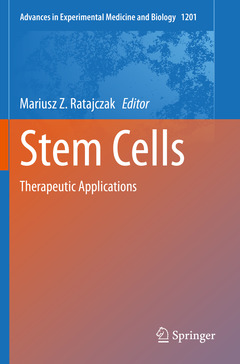Description
Stem Cells, 1st ed. 2019
Therapeutic Applications
Advances in Experimental Medicine and Biology Series, Vol. 1201
Coordinator: Ratajczak Mariusz Z.
Language: English
Subjects for Stem Cells:
Publication date: 08-2021
406 p. · 15.5x23.5 cm · Paperback
Publication date: 01-2020
406 p. · 15.5x23.5 cm · Hardback
Description
/li>Contents
/li>Biography
/li>Comment
/li>
Since different types of stem cells for therapeutic applications have recently been proposed, this timely volume explores various sources of stem cells for tissue and organ regeneration and discusses their advantages and limitations. Also discussed are pros and cons for using embryonic stem cells, induced pluripotent stem cells, and adult stem cells isolated from postnatal tissues. Different types of adult stem cells for therapeutic applications are also reviewed, including hematopoietic stem cells, epidermal stem cells, endothelial progenitors, neural stem cells, mesenchymal stem cells, and very small embryonic-like stem cells. This book also addresses paracrine effects of stem cells in regenerative medicine that are mediated by extracellular microvesicles and soluble secretome. Finally, potential applications of stem cells in cardiology, gastroenterology, neurology, immunotherapy, and aging are presented. This is an ideal book for students and researchers working in the stem cellresearch field.
Stem cells and a hope for their potential clinical applications in regenerative medicine.- Genomic instability of iPSCs and challenges in their clinical applications.- Hematopoietic stem and progenitor cells (HSPCs).- Neural Stem Cells.- Therapeutic Potential of Mesenchymal Stem Cells in Immune-Mediated Diseases.- Stem Cells in the Mammalian Gonads.- Stem and progenitor cells in the pathogenesis and treatment of digestive diseases.- Stem cells in psychiatry.- The role of EVs as paracrine effectors in stem cell based therapies.- Cellular Therapy for Ischemic Heart Disease: An Update.- Vasculogenic stem and progenitor cells in human: Future cell therapy product or liquid biopsy for vascular disease?.- Epidermal Stem Cells.- Stem Cells in Lungs.- Targeting purinergic signaling and cell therapy in cardiovascular and neurodegenerative diseases.- Plausible links between metabolic networks, stem cells and longevity.- Index.




